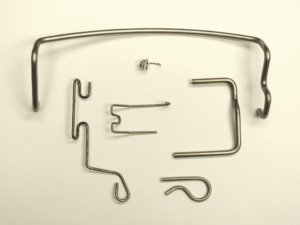At Gifford Spring Company, we can form just about any round material into a custom wire form. But we like to dig deeper with our customers so that they feel confident they are using the best material possible for their specific applications.
When selecting a material for your wire form, it is critical to look at your project from multiple angles, including budget, manufacturability, and end-use environment. If you are not sure where to begin, we are here to guide you in the right direction.
Selecting the Right Material for Wire Forming Services
The first question to ask yourself when choosing a material for your wire form is: what do I need my wire form to do in its end-use environment? If the wire form wil
l function like a spring (e.g., holding tension or springing back to a specific shape), then it must be formed from a spring steel such as one of the materials we use for custom springs:
- Music wire is a popular material used for manufacturing custom springs. It is a basic carbon spring steel that is cost-effective and functions well at temperatures up to 200 degreesFahrenheit. However, it is not corrosion resistant, so we would not recommend this material for springs that will function in outdoor or wet environments without adding a finish or coating to provide better protection.
- Stainless steel is slightly more expensive than music wire, but it has a higher resistance to heat and corrosion. Stainless steel does not usually require finishing or coating processes. Customers can choose from a few different grades of stainless steel, including 302, the standard option; food-grade 316; and 17-7, which has the highest heat resistance of the steel grades—up to 600 degrees Fahrenheit.
- Inconel X is not commonly used because of its high price, but it is necessary for certain applications that must withstand extreme environments. This exotic material is heat resistant up to temperatures as high as 1,100 degrees Fahrenheit.
- Other materials such as brass, beryllium copper, and phosphor bronze, can be expensive and difficult to source for spring and wire form manufacturing. However, our customers sometimes require the magnetic, conductive, corrosion resistant, acid resistant, or salt water resistant properties of these less common materials for their applications.
If your wire form does not have spring-like properties, there are several other material options available. From least to most expensive, here is a list of materials we typically use for wire forming services that are not spring tempered:

Carbon steels
Basic carbon steels like C1008 or C1018 are the lowest-cost option for custom wire forms. However, these materials are not particularly corrosion resistant. These basic steels typically have lower tensile strength than other materials (about 49,300 psi).
Hard drawn steel
Hard drawn steel is a type of carbon steel with significantly higher tensile strength than C1008 and C1018, ranging from 220,000-315,000 psi. This material is similar in tensile strength to music wire, but should be avoided for any spring-like applications due to inconsistency in tensile strength.
Pre-plated materials
When it makes sense for your application, using a pre-plated material—like galvanized steel wire or pre-plated zinc—is always cheaper than plating after manufacturing and removes any chance of damaging parts during the plating process. However, there are sourcing challenges associated with acquiring pre-plated materials: the selections are often limited, and lead times can be long. Pre-plated materials are often a great solution, we suggest discussing projects using this material early-on to mitigate any longer lead times.
Lower tensile stainless steels
Lower tensile stainless steels are ideal for custom wire forms that need to be flexible and corrosion resistant. Additionally, if your part does not require the high tensile strength of standard stainless steel, you can often save money on manufacturing costs by using a lower tensile alternative. While the cost of the material itself is not significantly different, lower tensile steels are easier on tooling and more forgiving in manufacturing, which can help keep prices down.
At Gifford Spring Company, we want to be your go-to resource for wire forming services. Whether you need support selecting the right material or already have your material picked out, request a quote today to begin (or continue) our partnership!